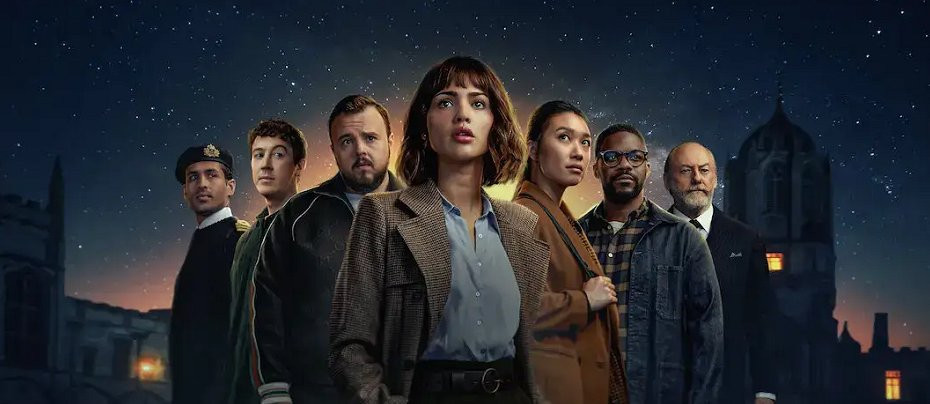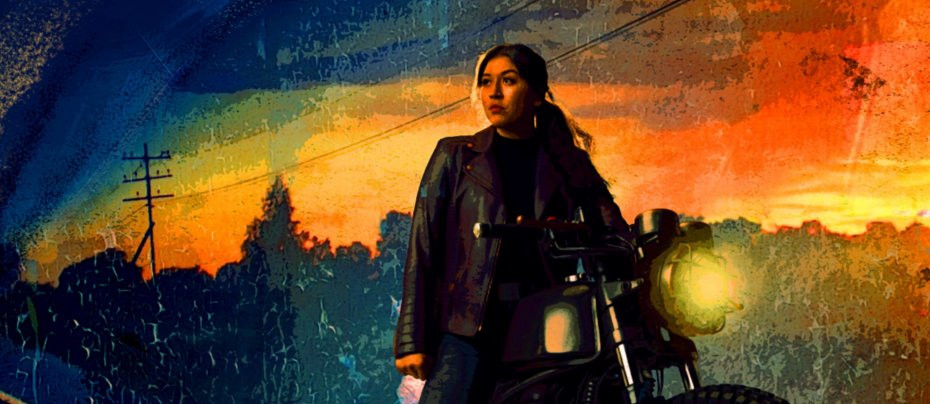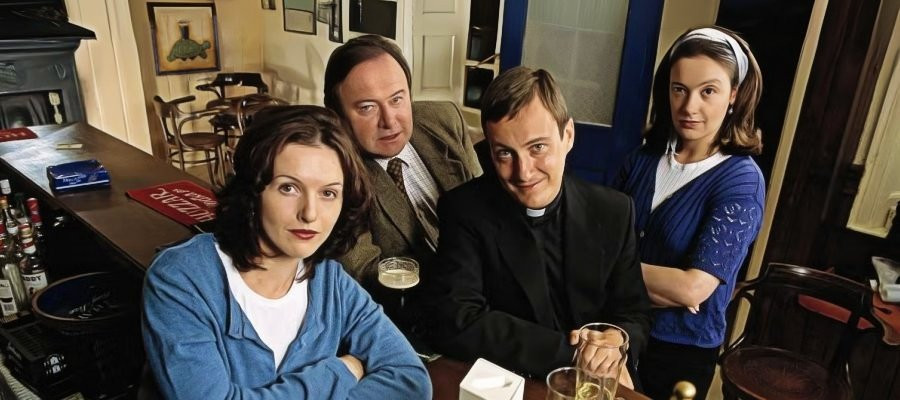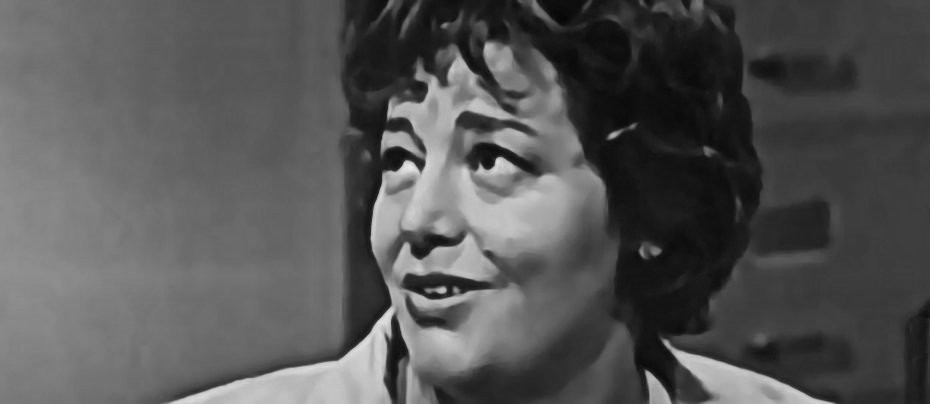
Red One
2024 - United StatesReview by John Winterson Richards
Although it may seem out of place to review Red One, a feature film that had a full cinematic release, on a website dedicated to the history of television, this generally forgettable production represents an important moment in the relationship between what have always been viewed as two separate media.
The boundaries between cinema and television, especially streaming, have been blurring for some time now. The first and most important step was actually taken in the early days of television, when it first started airing feature films. Nevertheless care was taken to maintain a definite gap, usually of several years, between a film's cinematic, or, in America, theatrical, release and the television rights being sold. This was mainly to ensure that the producers got every cent they could out of the cinema audience before selling the leftovers to television but also to retain the sense that there was something special about cinema as a medium.
There was a definite class system. Going out to see a film on the big screen was an event. Cinema looked down on the vulgar upstart with the tiny screen in the corner of every home. Film stars might lower themselves to do the odd guest slot on a television show but were careful not to cheapen their brands by being seen there too often. Similarly, actors who became as well known, and sometimes as wealthy, as major film actors through their regular appearance on that small screen in every home often found it difficult to make the transition to cinema, because, it was thought, the public associated them too much with their television work to suspend disbelief when seeing them in different film roles. There was a similar division between film and television directors, writers, and producers, if for slightly different reasons.
That class system has been breaking down in recent years. At the same time the period between a film's cinematic release to its first appearance on television has been diminishing, sometimes to a matter of months, especially if the television rights are pre-sold as part of the production's financing package.
The streaming services have accelerated this process since they started commissioning their own content. A few years ago Netflix came up with the brilliant idea of giving prestige projects, such as The Two Popes and The Irishman, a limited cinema release before streaming them in order to qualify for the Oscars and other profile raising Awards. This strategy was successful and prompted the obvious thought, "Since we have spent the money on the production anyway, why not have a full scale cinematic release and not just a token limited run?"
There is an equally obvious answer to that "Why not?" A full cinematic release is expensive: the traditional rule of thumb is that the additional cost increases the break even point to double the cost of the actual production. Yet the temptation to "double dip" remained. After all, films produced for the cinema also did well on television and streaming, so was it illogical to assume that it might work the other way to? Could a film produced for streaming pick up money from a full theatrical run first?
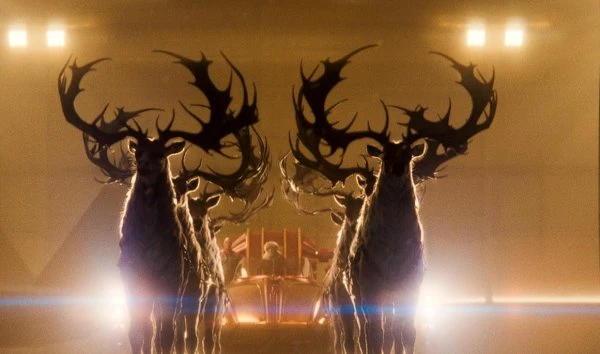
It is to this question that Red One has now provided a definite answer. It tanked at the box office. Various excuses have been suggested. It was released too far ahead of Christmas. Audiences in general are still hostile towards Hollywood in general after a divisive period in American cultural history. The star of the film, Dwayne "The Rock" Johnson, has recently had public relations problems after building his career on his previously likeable image. Chris Evans, his co-star, has demonstrated little commercial appeal beyond his Captain America role.
There is some truth to all of these points, but worse films than Red One have succeeded in spite of such obstacles. The real reason for its cinematic failure was its purpose. Audiences saw it for what it was, a cynical attempt to make extra money from a film produced for streaming. Most people find out about films through the internet these days. Anyone looking for a film to see on a night out would probably have noticed that Red One was financed by Amazon and concluded, correctly, that it would therefore be available for streaming very soon, almost certainly before Christmas. So why spend the now considerable sum required to take the children out to see it when it will be available at home at the more appropriate time? Audiences are not stupid, even if executives often seem to be.
Was the quality of the film a contributing factor in its failure? Not really. The "professional critics" on 'Rotten Tomatoes' were unimpressed, but they count for little now. Audience scores were much higher. The best summary is that it is a fairly solid streaming film but not worth the price, the time, or the energy of a trip to the cinema on a cold November evening.

The plot actually has some potential. Johnson is Santa's head of security when Saint Nick is kidnapped on Christmas Eve. Your reviewer was not the only one to think immediately of Lee Majors' cameo in Scrooged - satire has now become a serious premise. In a standard subplot, Evans is the traditional deadbeat Dad who learns valuable lessons helping Johnson rescue the Old Man in time for the reindeer run. It basically writes itself - and sometimes seems as if it did.
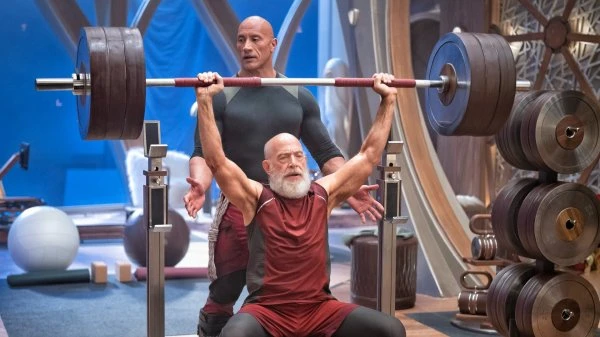
The ever watchable J. K. Simmons is an energetic Santa who gives a credible demonstration of how it might be possible to get down all those chimneys in a single night. Kristofer Hivju (Game of Thrones) has a couple of good scenes as his estranged brother, Krampus. It is always pleasant to see Lucy Liu, even if she is underused as the director of an agency dealing with mythological beings. Indeed, this whole side of the script is underdeveloped: it is intriguing to have a brief cameo by the Headless Horseman from The Legend of Sleepy Hollow, and to see that Santa employs polar bears and penguins (at the North Pole?) but they do not really add anything to the story. There are a lot of clever ideas that simply go nowhere.
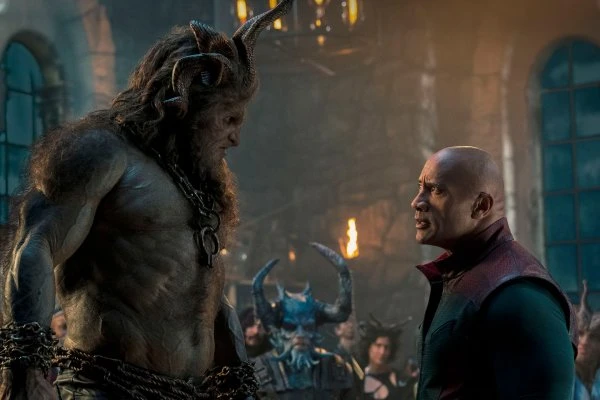
There is also an uncertainty of tone. Some aspects of this film are not really suitable for children but neither is there a subversive subtext that might keep adults entertained on a family night out. The notion that Santa is really the CEO of a huge industrial enterprise with close connections to the Deep State is interesting but hardly appealing. "He knows when you are sleeping, he knows when you're awake, he knows when you've been bad or good" suddenly seems a bit sinister. The corporatist nature of Santa's operation is actually a good metaphor for the whole production. It is predictably reliant on CGI. Everything is efficient but lacking in real human interest. The usual cliche of a child whingeing because his father cannot make some insignificant concert adds nothing to the proceedings. It would be a refreshing change if the Christmas message was teaching the child that an adult has adult responsibilities.
As it is, Red One is a better than average Christmas movie, a well packaged example of a genre rarely noted for originality. As a comedy, it is not very amusing. As an action film, it is not very exciting. As a family drama, it is not at all moving. It is slightly superior consumer fare that sums up what Christmas has become, the sort of colourful noise that can provide background to the usual feast of excessive consumption, an ideology it does not challenge but rather endorses. It is not bad of its type but there is more genuine human emotion in a single scene of The Muppet Christmas Carol than in the whole running time of Red One, which is over two hours and begins to feel it. This is not to say it is boring. It is just exactly what you would expect from Amazon.
Seen this show? How do you rate it?
Seen this show? How do you rate it?
Published on December 24th, 2024. Written by John Winterson Richards for Television Heaven.



